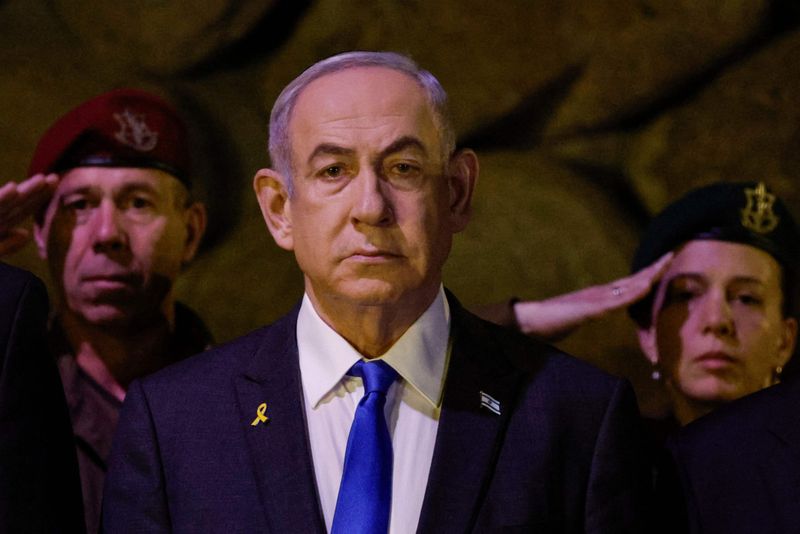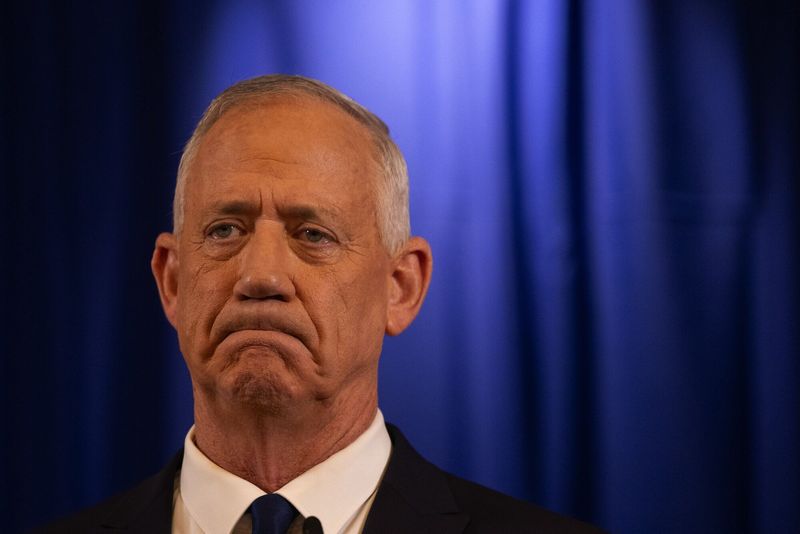
JERUSALEM: In the traumatic aftermath of the October 7 attacks on Israel, as hundreds of thousands of Israeli reservists rushed to join the ranks to fight Hamas, Benny Gantz said he felt it was his duty to join the war effort.
“This is not a political partnership I am in,” the centrist former general told a group of reporters, shortly after agreeing to join Prime Minister Benjamin Netanyahu in an emergency wartime government of unity. Instead, it was “destiny”.
“Hamas started the war but Israel will win it. There is no doubt about it. We will win this war,” he said.
Now, eight months in, the early confidence of those remarks made as Israel was starting to get back on its feet following the shock of October 7, appears to have ebbed.

Having tangled repeatedly with the prime minister and the hardline nationalist religious parties in his coalition, Gantz has quit, three weeks after laying down a deadline for Netanyahu to come up with a clear postwar strategy for Gaza.
His departure will remove one of the few in Israel’s government who still appeared to enjoy the confidence of a US administration whose frustration with Netanyahu has become ever more evident as the war has gone on.
Even before the deadline, he had appeared increasingly unhappy with the government, quarrelling over issues ranging from the army leadership to opening a path towards a two state solution with the Palestinians. In April he called for new elections to be held in September, only to see the call rejected.
The commanding lead over Netanyahu he and the centrist party he leads once held in the opinion polls has shrunk, and, with the ruling coalition’s parliamentary majority still solid, his political future is unclear.

Five years later, the silver-haired Gantz is looking to ride a wave of mounting public outrage over Netanyahu’s failure to return hostages held in the Gaza Strip more than eight months after the war with Hamas broke out.
Days after October 7, Gantz, who turned 65 on Sunday, joined a war cabinet chaired by Netanyahu and became a minister without portfolio in his rival’s administration, labelled the “Unity Government”.
“Israel above all,” Gantz, one of the main opposition leaders at the time, said on social media.
But in a televised address on Sunday, Gantz announced: “(Benjamin) Netanyahu is preventing us from progressing to a real victory. That is why we are leaving the emergency government today with a heavy heart.”
His departure is not expected to bring down the government, a coalition including religious and ultra-nationalist parties. But it is the first major political blow to Netanyahu during the war, reflecting rising domestic pressure over its conduct.
‘ONLY THE STRONG SURVIVE’
Gantz triggered the ire of Netanyahu’s right-wing Likud party in March when he made an official visit to Washington.
He continued his political manoeuvring in the following weeks, calling for early legislative elections and issuing an ultimatum to Netanyahu: agree to a plan for post-war Gaza by June 8, or Gantz would quit the government.
Last month, his party said it had submitted a bill to dissolve parliament and hold an early election - in which it would have little chance of success against Netanyahu’s coalition.
Since his entry into politics, Gantz has fought several electoral battles against Netanyahu, without ever truly defeating him.
Early on, he tried to play up his defence background, releasing campaign videos in 2019 titled “only the strong survive” that highlighted military operations in Gaza.
He formed a power sharing alliance with Netanyahu in May 2020 as part of an effort to address the Covid-19 pandemic, but Netanyahu did not honour the deal.
That led to fresh polls in 2021, after which Gantz joined a coalition led by Yair Lapid.
“I hope to succeed in achieving unity, bringing as many people together as possible, freeing us from the political burden of Netanyahu,” Gantz told AFP in 2022.
But his efforts failed and Netanyahu managed to form a coalition with the support of far-right parties.
Analysts said Gantz was unlikely to succeed in ousting Netanyahu even now.
“Gantz has gone down a lot in polls recently, because he’s perceived as too soft, too hesitant, too complacent towards Netanyahu,” political scientist Ilan Greilsammer told AFP.
A former paratrooper who grew up on a kibbutz and commanded the elite Shaldag commando unit, Gantz, the son of a Holocaust survivor, spent most of his career in the military.
As army chief of staff in 2012, he oversaw an eight day-operation in the Gaza Strip that began with the killing of the chief of Hamas’ military wing in Gaza.
He served as defence minister in the previous government and for months, his hawkish military credentials allied to his opposition to Netanyahu’s divisive campaign to trim the powers of the judiciary last year, made him seem like the natural choice to lead a future government.
He has called for Israeli military control over most of the West Bank, which has been occupied by the Israeli army since 1967, as well as the annexation of the Jordan Valley.
He joined the army aged 18, rising to the rank of general in 2001 and head of the army in 2011, when he led two wars against Hamas.
“He did not leave an indelible mark on the army but maintained an image of stability and honesty,” according to Amos Harel, a defence reporter at Israeli daily Haaretz.
Even as he sought to strike Palestinian groups responsible for anti-Israeli attacks, he simultaneously engaged in discussions to address “security and economic issues” with the Palestinian Authority, which has partial administrative authority in the West Bank.
In August 2022, as defence minister, he launched a three-day air and artillery operation against Islamic Jihad militants in the Gaza Strip.
In total, 49 Palestinians were killed, including fighters.
“It is a military success... We will not hesitate in the future to carry out other such operations,” he said at the time.
He has also been notably more open to the idea of a political settlement with the Palestinians than either Netanyahu or his right-wing allies like Finance Minister Bezalel Smotrich or National Security Minister Itamar Ben-Gvir, for whom a Palestinian state is an anathema.
Gantz, while mistrusting many Palestinian leaders, always seemed more willing to accept that Israelis and Palestinians eventually had to learn to live in the same region. “No one is going anywhere,” he said.
With relations between Washington and Israel at their lowest point in years over the conduct of the war and the mounting casualty toll in Gaza, Gantz, along with Defence Minister Yoav Gallant, appeared to be one of the few in government trusted by US President Joe Biden’s administration.
Earlier this year, he visited Washington, infuriating allies of Netanyahu, who has so far not received an invitation to the White House. But his political instincts have been no match for Netanyahu, one of Israel’s wiliest operators, who rode out the rebuff from Biden and is due to address both houses of Congress next month.
Many on the left thought Gantz and his centrist partners should have left the government sooner. Others, like Einav Tsengaukar, the mother of one of the Israeli hostages left in Gaza, who begged him to stay and try to agree to a deal to get the hostages home, wanted him to remain. But in the end, his departure appeared inevitable.
Aviv Bushinski, a former communications adviser to Netanyahu, said in the end, Gantz’s own attempt to pressure Netanyahu had only succeeded in paving the way for his own exit.












